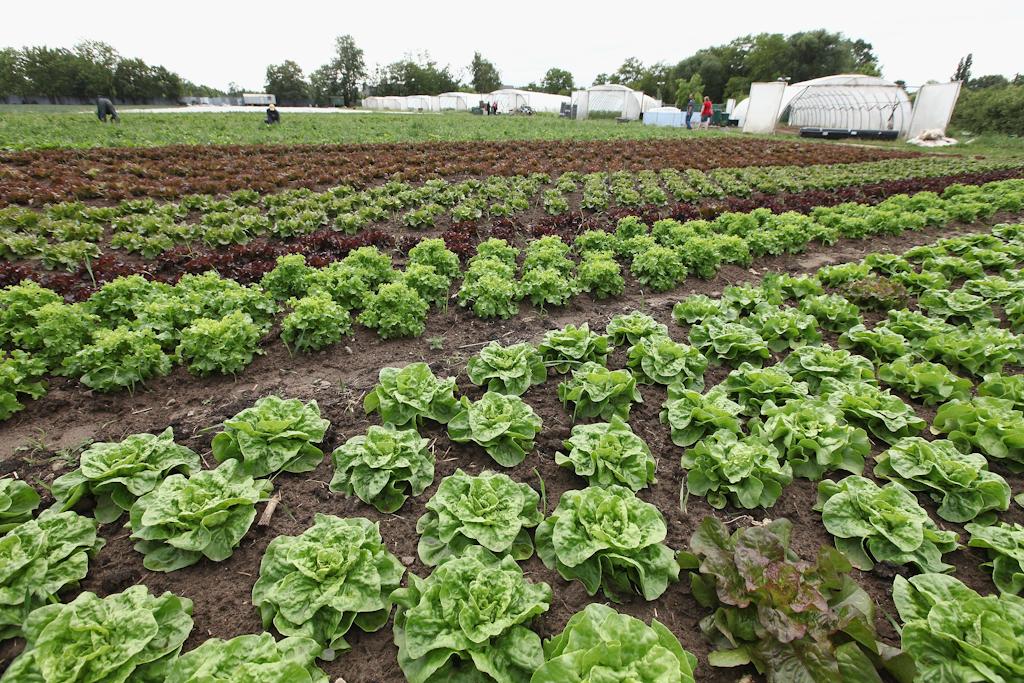Russia bans import of EU vegetables over E.coli fears
Lettuce grows at the Teltower Ruebchen organic vegetable farm on June 1, 2011 in Teltow, Germany. Organic farmers in Germany are reporting a surge in demand for lettuce and cucumbers in the wake of an outbreak of enterohemorrhagic E. coli, also known as the EHEC bacteria, that German authorities initially tentatively blamed on cucumbers, lettuce and tomatoes imported from Spain. German health authorities have since recanted and now claim they are starting over in their search for the origin of the outbreak that has killed at least 16 people and whose spread is continuing unabated in northern Germany.
With no clear source identified in the deadly E.coli outbreak centered on Germany, and with the number of infection cases rising, Russia on Thursday banned the import of all raw vegetables from the European Union.
Russia's chief medical officer said EU-grown fresh vegetables would be seized across the country, a move that Brussels called “disproportionate.”
More than 1,500 people in eight countries have been infected by a new and particularly aggressive strain of E. coli, which can cause deadly hemolytic-uremic syndrome (HUS), a condition that leads to bloody diarrhea, kidney failure, coma and even death.
Seventeen people have died in the outbreak, 16 of them in Germany and one in Sweden.
There were 365 new cases reported Wednesday, most of them clustered in Hamburg, where the outbreak of Enterohemorrhagic E.coli has been centered. EU officials said there have been three cases in the United States, all involving people who had recently travelled to Hamburg.
The crisis has left Germans “frightened, frustrated or plain bewildered,” GlobalPost’s David Wroe reports from Berlin.
It was first thought that infected cucumbers from Spain were the source of the outbreak, but this theory has now been discounted and German officials have since backtracked and apologized to Madrid. German health officials have admitted they do not know where this strain of E.coli has come from, and it may be months before the outbreak stops.
The World Health Organization said Thursday that the E.coli bacteria responsible for the outbreak is a new strain with "various characteristics that make it more virulent and toxin-producing."
Hilde Kruse, a food safety expert at the WHO, told The Associated Press that "this is a unique strain that has never been isolated from patients before."
The European Union said that it would be lodging a protest against the Russian ban. The total value of EU exports of fresh fruit and vegetables to Russia is estimated at 3 billion to 4 billion euros a year, mainly from Spain, France, Germany and Poland.
Russia banned fresh vegetable imports from Germany and Spain earlier this week, and on Thursday announced the ban would be extended to cover the entire European Union.
"The fresh vegetable import ban affecting all EU countries went into effect this morning," said Gennady Onishchenko, head of Russia’s consumer protection agency.
"I call on people to forgo imported vegetables in favor of domestic products," Onishchenko said, reports Interfax.
Spain has threatened legal action over the crisis, and is seeking compensation for the farmers who have lost sales of 200 million Euros a week, Reuters reports.
The story you just read is accessible and free to all because thousands of listeners and readers contribute to our nonprofit newsroom. We go deep to bring you the human-centered international reporting that you know you can trust. To do this work and to do it well, we rely on the support of our listeners. If you appreciated our coverage this year, if there was a story that made you pause or a song that moved you, would you consider making a gift to sustain our work through 2024 and beyond?
